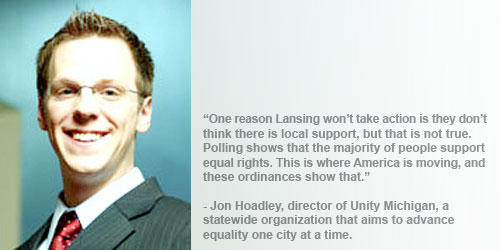
Michigan's legislators in Lansing may not be ready to step up and declare equality for the LGBT community, but across the state individual communities have been creating local ordinances that prevent discrimination and publicize that anti-gay bias is something they won't tolerate.
The past year has seen more advances than setbacks according to Jon Hoadley, director of Unity Michigan, a statewide organization that aims to advance equality one city at a time. Working with groups like Equality Michigan, the ACLU, KICK, Affirmations, the Ruth Ellis Center and the Michigan Roundtable for Diversity and Inclusion, Unity Michigan provides data and support to groups that want to create change in their communities.
In 2012, four Michigan cities passed non-discrimination ordinances. Elected officials in Mt. Pleasant approved theirs on July 9, Muskegon approved theirs on Aug. 14, and Union Township approved theirs Sept. 26.
Flint also passed an ordinance expanding their current non-discrimination ordinance, however when the Emergency Financial Manager law was voted down statewide, all ordinances enacted in Flint by the EMF were removed, including the non-discrimination ordinance. Their previous non-discrimination ordinance is still in effect, but the gender expression component is not.
So overall, Michigan gained three. Progress has also been made toward enacting one in Royal Oak, with city commissioners voting to have the city attorney draft an ordinance that will be voted on in 2013.
The total statewide is now 21. But what does that mean for the communities that have them, and for the state as a whole?
Hoadley explained that ordinances may vary from city to city. Some may include "gender expression," while some just include "sexual orientation." The most inclusive ones protect individuals from discrimination in housing, jobs and accommodations, but not every city has all those provisions. The penalties for violating the ordinance may also vary.
But what they all do is demonstrate the growing trend toward LGBT acceptance.
"Michigan has a rich tradition of local governance," Hoadley said. "This is something we are empowered to do. They [cities] can protect their resources when Lansing won't. One reason Lansing won't take action is they don't think there is local support, but that is not true. Polling shows that the majority of people support equal rights. This is where America is moving, and these ordinances show that."
In addition to the protections implemented, the process of passing non-discrimination, or human rights, ordinances has other benefits. "These start by local efforts, with people in the communities coming together to create change. First, the passages themselves start conversations that let people know about the lack of protection LGBT people face. There's a fuller sense of community, and it gets people involved in the political process. After it's passed, it's not done. There are conversations with businesses and governments to make sure we're treating people fairly."
The Williams Institute in California offers multiple studies and other research to show the need for listing sexual orientation and gender expression as protected classes. For example, 37 percent of gay and lesbian respondents to a 2008 General Social Survey had experienced workplace harassment in the last five years, and 12 percent had lost a job because of their sexual orientation. As recently as 2010, 78 percent of respondents to the largest survey of transgender people to date reported having experienced harassment or mistreatment at work.
Cities with inclusive protections attract LGBT residents and workers, as well as allies who see the treatment of LGBT people as a litmus test for progressive values and overall care and respect. Where inclusive polices can be an economic draw for communities, it's proven to be a successful way for private business to grow. According to the Human Rights Campaign, 86 percent of the Fortune 500 companies include sexual orientation in their nondiscrimination policies, and 50 percent include gender identity. A Williams Institute study shows that large companies report that they adopt these policies to improve employee retention, recruitment, and productivity, as well as to generate the best ideas and a stronger customer base.
The biggest argument against inclusive non-discrimination polices is that it may bring lawsuits or cause strain on administrators to implement or enforce. Yet the Williams Institute research shows that LGBT lawsuits happen at about the same rate as discrimination cases involving race or gender.
Royal Oak, Holland, Rochester Hills and Jackson are among the cities where a human rights ordinance is being discussed, and there's no telling how many other cities will move forward in the coming year. In general all it takes is a vote of the city's elected officials, though sometimes petitioning for a public vote can work when officials are unresponsive.
Unity Michigan has worked with members of several communities that have passed the ordinances. They offer model ordinance wording, best practice advice, and information about messaging and the political process. They can help identify supporters and donors, and can connect interested advocates with others who have passed ordinances in their hometowns. They also have ties to community centers and other organizations involved in the fight for equality.
To learn more about Unity Michigan and the push for nondiscrimination ordinances, check out their website at http://www.unitymichigan.org/.










